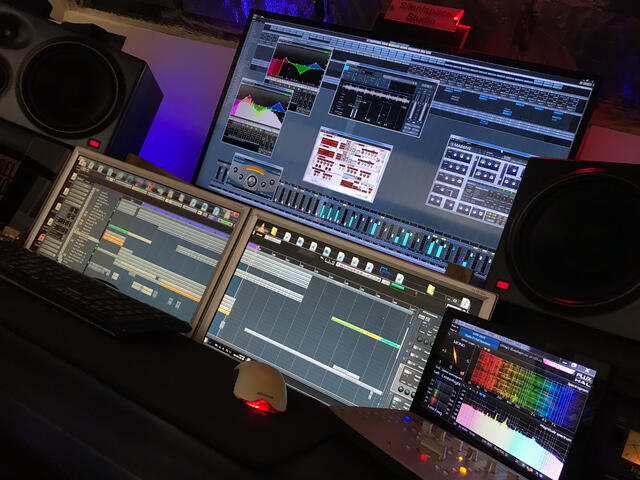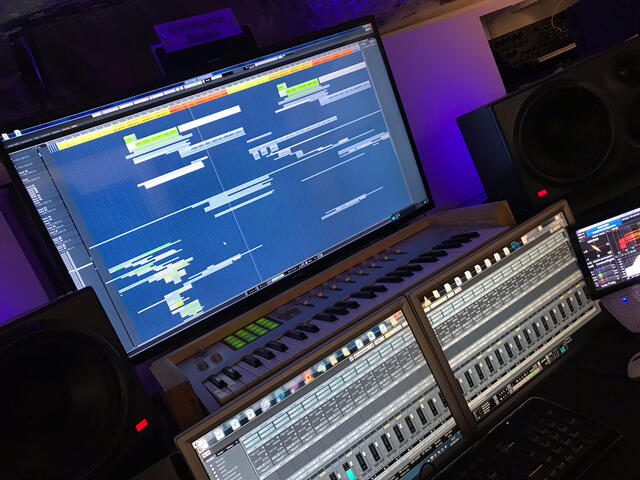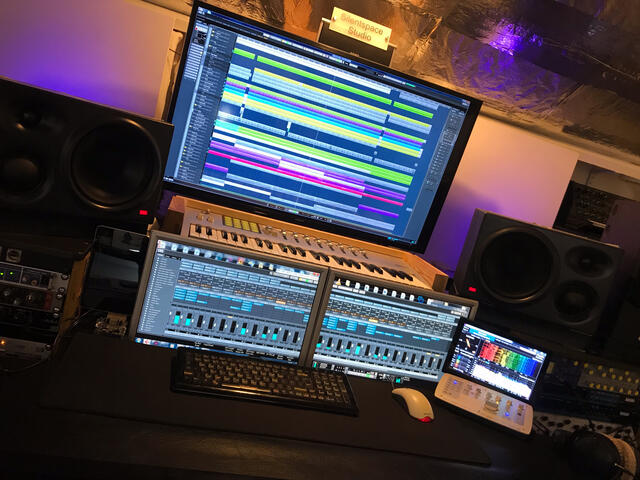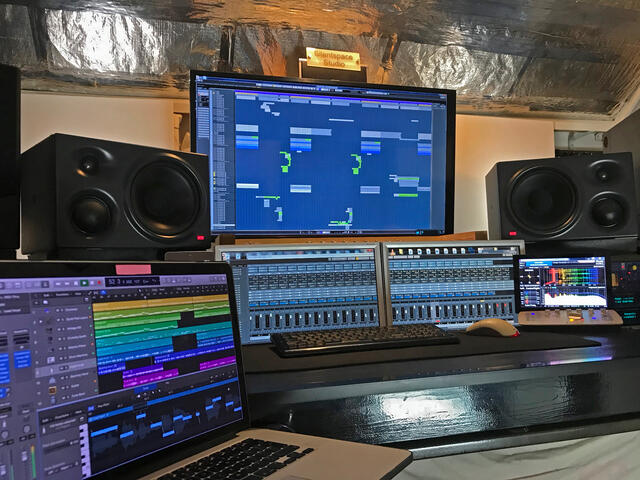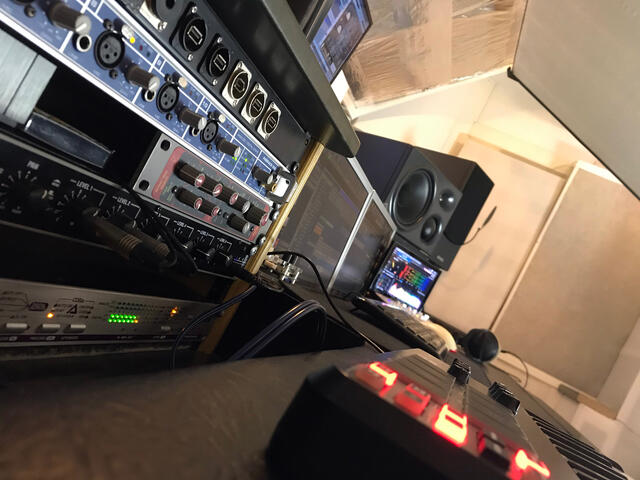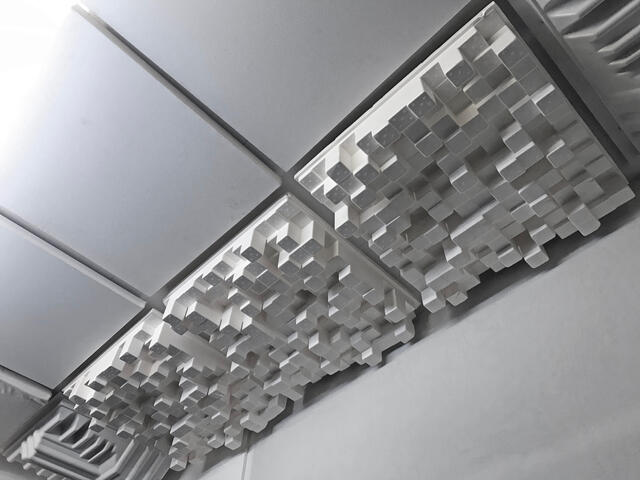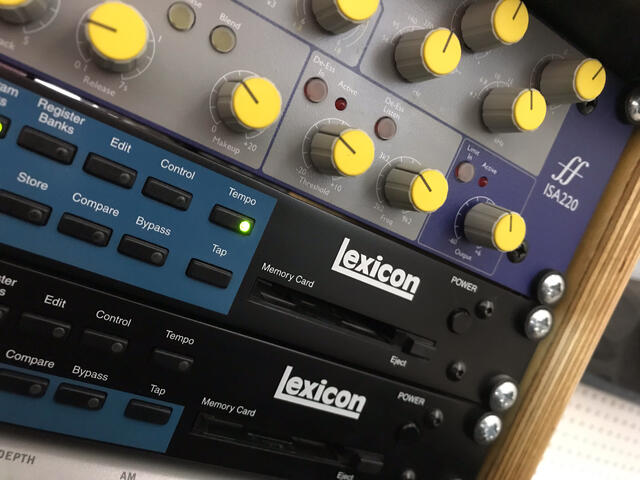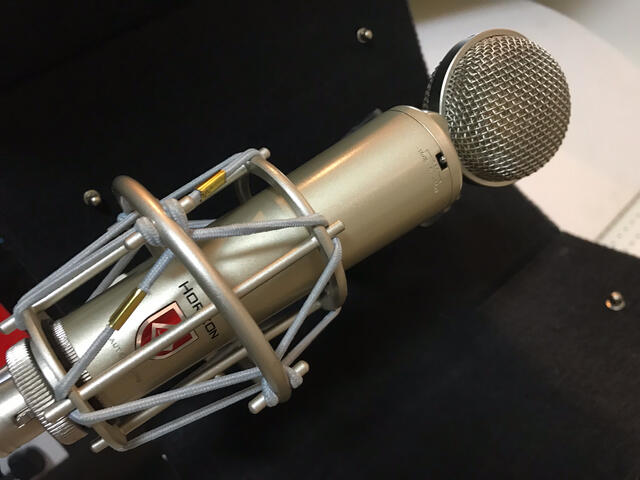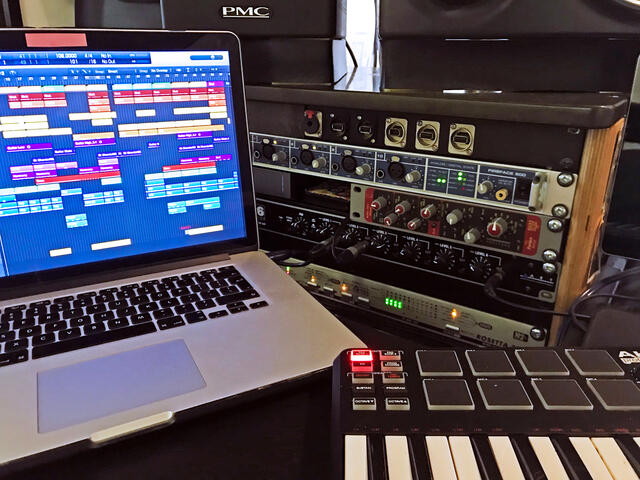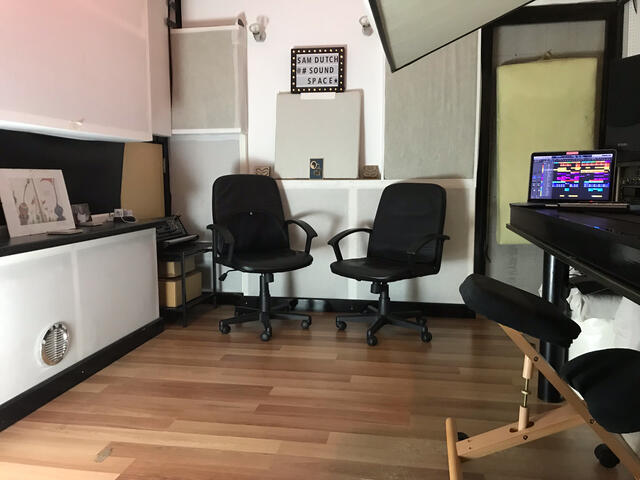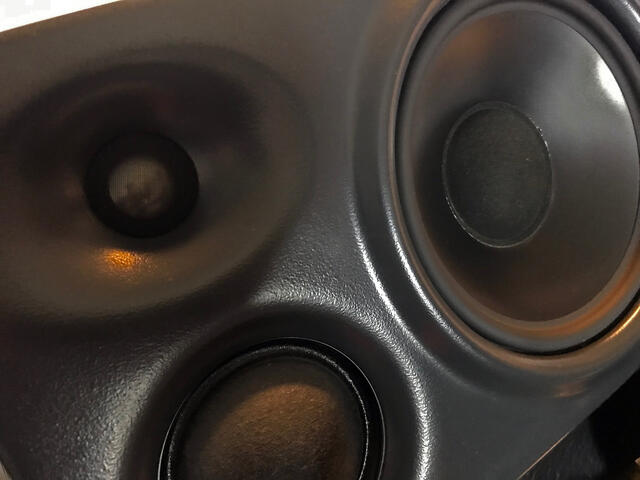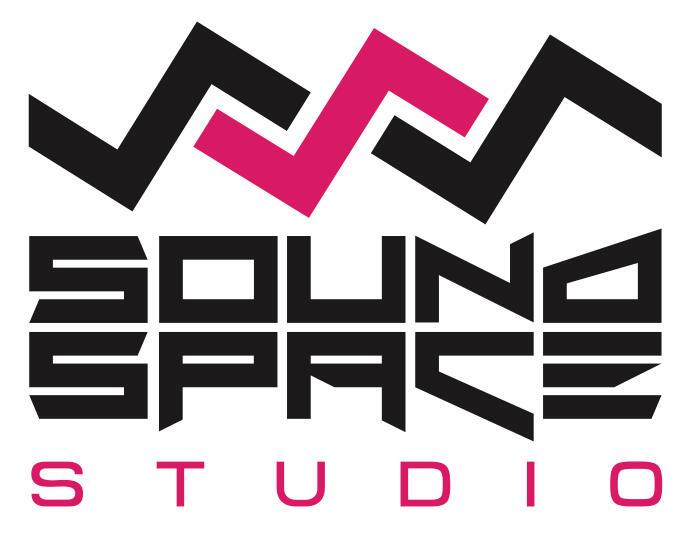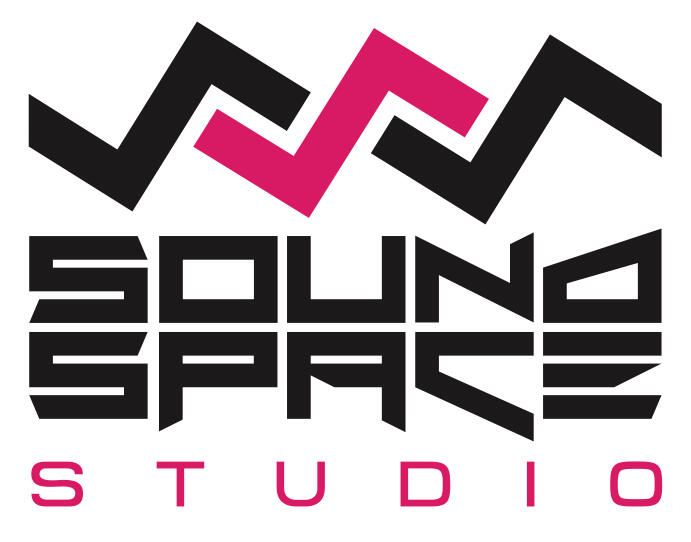
Recording - Production - Mixing - Mastering
.
High Quality Vocal & Instrument Recording
Electronic & Pop Music Production Specialist
Text
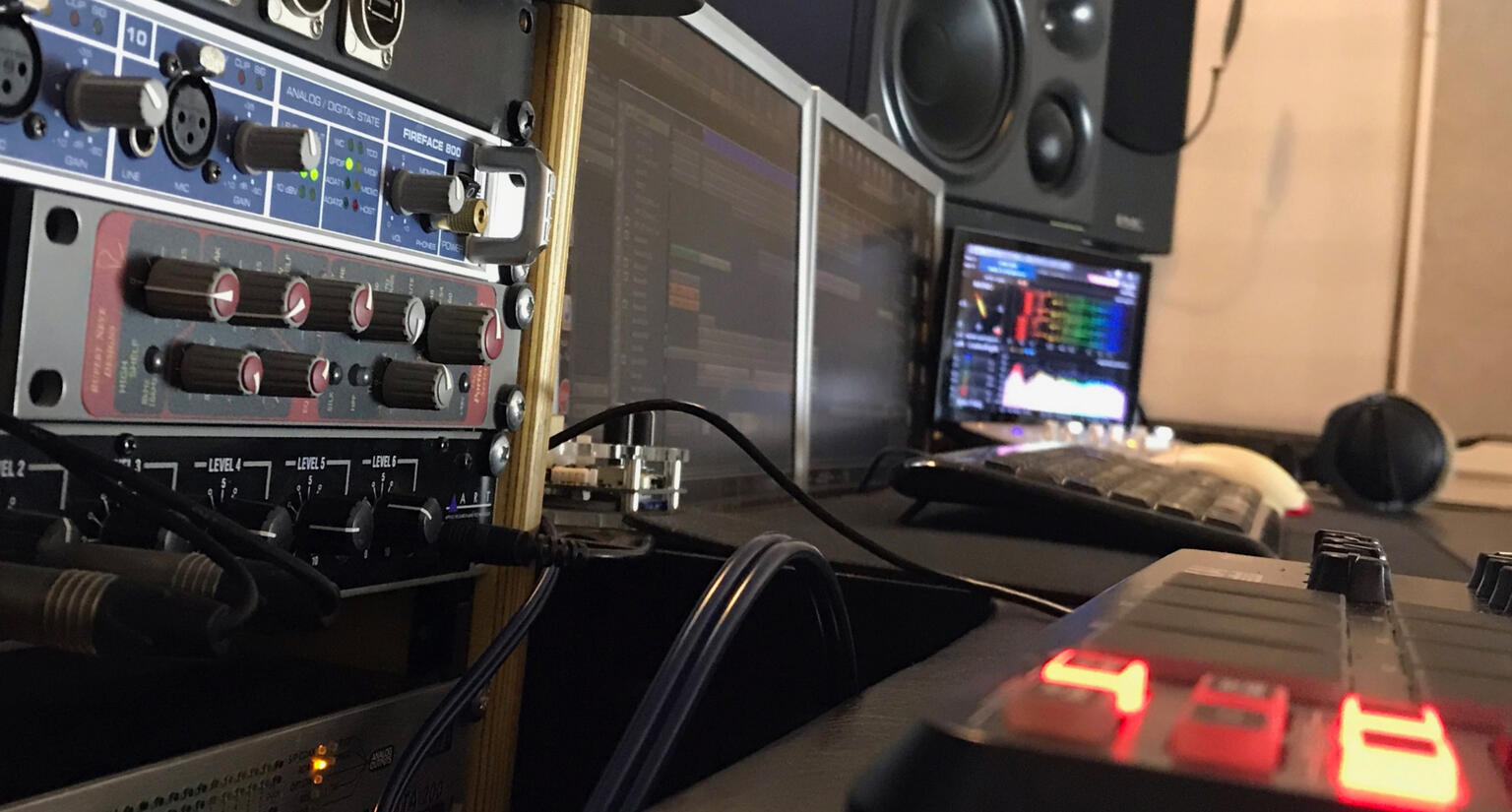
RECENTLY UPGRADED - NEW PHOTOS SOON.
*
Text
© The Sound Space. All rights reserved.
Sound Space have had the privilege to work with and record many talented artists, including:
Daddy U Roy, Javid Bashir, MC Navigator, Rawhill Cru, The Freestylers, MC Bassman, Hayley Cassidy, Cheshire Cat, Roach Killa, Prince Jamo, C@ in the H@, Universe Media, Ragtime Records, Mr FX, Electric Swing Circus, Lady MJ Warrior, Scientist Sound System, Mani Hype, Dipti Sharma, P Dot, Laura Louise, WhoisPDP, Alanna Lyes, Reuben Gondor, Alaska MC, Deficit, The Fritz, Digga Ranks, Duke Skellington, The Screening, Robbo Dread and many more.
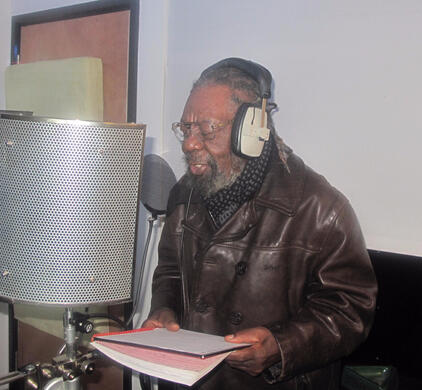
Reggae legend Daddy U-Roy recording at Sound Space
Examples of previous work
Before and after playlist
Tracks that clients have bought in compared to what they have left with.
Recording And Production
Composition, Vocal Recording, Additional Production
Mastering
---
---
We understand how hard you've worked on your music, we're here to help you take it to the next level.
RECENT UPGRADES INCLUDE PMC SIX-TWO MONITORS
High Resolution Variable Acoustics
Monitoring by Audient, K+H, Avantone, Genelec and PMC
Digital Conversion by RME, Apogee and Audient
Microphone Premplification by RND and Focusrite
Moog Voyager, Roland SH101
Outboard including Lexicon and Focusrite
Quotations provided upon request
Discounts for block bookings and regular sessions
"I have been working from this space for over ten years, helping others to realise their musical ambitions and also creating my own projects. I have recorded and produced for many artists from seasoned industry professionals to artists just starting out on the recording path.
My speciality is working with songwriters, vocalists, beat makers and producers to bring their visions to light. Especially in hip hop, modern pop and electronic styles."Dan - Producer / Engineer
Text
NOW OFFERING ARTIST MENTORING AND DEVELOPMENT
Quote Request Form
Near Bearwood, Sandwell, UK.
15 mins from Birmingham Centre.
Off Road Parking.
Kitchen Facilities.
Visits by appointment only.
Email and socials at the bottom of the page
_
© The Sound Space. All rights reserved.
Are you just starting out following your musical aspirations?
Do you want to develop your techniques as well as finish your songs?
Are you a music producer or singer / songwriter who struggles to finish your music?
Perhaps your mixes don’t translate the way you want them to?
Sound Space offer services that range from critique and feedback, remixes or re-presentation of existing recordings through to turning a vague idea in to a fully fledged finished master. We teach music production and sound engineering and help artists of all levels to develop and evolve. We have experience in mentoring artists all the way from initial concepts such as identity and branding through songwriting and composition all the way to release strategy and monetisation.As well as individual sessions, we also offer monthly subscription packages that combine recording and production time with tuition and artist development. These packages mix either in house or remote writing, recording and production sessions with training and tuition if required. This provides a cost effective way to work with us for long or complex projects (e.g. writing and producing an album or a live show). This is also an ideal opportunity for those who are looking to develop their skills and techniques at the same time as finishing their music. These sessions build towards your own unique goals. Want to put some music online, but no-idea where to start? Need help in finishing those half written songs? Want your new EP developed, recorded and produced from scratch? Need help with branding or promotion? Looking to write an album that you want to perform live?
Then this is for you.We can also advise on equipment setups for home recording, help you record in your own space, advise on production and export techniques, and then transfer your files to the studio for additional composition and final production. We offer remote video sessions to walk you through techniques and process, so you learn new skills at the same time as getting great sounding music.
From first concepts to final masters, together we can turn your musical dreams in to a radio ready reality.
From voice note to finished song
Do you need your recordings to sound release ready and professional?
Do you want a high quality, relaxed environment to record in?
Looking for a professional finish to your vocals ?
Sound Space provide services ranging from high quality vocal and instrument recording through to custom made beats and backing tracks or overdubs and enhancement of existing material.We have recorded and produced for hundreds of artists, labels and clients over a wide variety of genres.Cleaning, comping, tuning and audio processing services can be provided independently of recording.Every project has different requirements, so please contact us to discuss your needs.
From first concepts to final masters, together we can turn your musical dreams in to a radio ready reality.
Vocals and guitars recorded at Sound Space Studio
Looking for somewhere to record your voiceover or advert?
Struggling to get your podcast recordings as clean as you need?
Need a mixtape put together?
Are you a DJ in need of some 'special sauce' for your set?
In fact, do you need assistance with anything at all audio related?
There is a wide range projects we've done for clients at Sound Space, from providing soundtracks to art exhibitions, cleaning up audio recordings, collages for dance groups, sound design for picture and games, a soundtrack to accompany a university dissertation, capturing recordings of small children for their parents, sound effects recording, remasters of old commercially released tracks, soundtracks for poetry, even creating a drum and bass soundtrack to an in house presentation at Zurich Insurance's head offices.No matter what your request, we've probably done something similar or will be able to advise you on the best way forward.
From first concepts to final masters, together we can turn your musical dreams in to a radio ready reality.
Part of the soundtrack to an art exhibition by P. Guinan
Are you a producer or musician with a music production set up at home?
Do you need guidance on how you can make your music sound better?
Are you looking to increase your production knowledge?
Are you a vocalist or instrumentalist who has never been to a recording studio before?
"I am Apple certified in Logic, and have used Cubase since v1.01. I have worked in locations from big studios behind SSL desks through to tiny spare room setups. I have spent years gathering both practical experience and the theory of music production and recording, and am more than happy to pass these skills and experiences on - from a simple enquiry about how a plugin works, or how to use a bit of hardware through to complete courses in specific software, production or recording techniques."
Dan - Producer / EngineerSound Space also run special sessions so that inexperienced artists can experience studio recording for the first time, in a comfortable, friendly environment. From explaining session practices and difffering mic techniques, through to studio etiquette and vocal coaching. We take our time to work through things at a pace the artist is happy with to ensure an educational and productive session. This often goes hand in hand with our artist development and mentoring services.
From first concepts to final masters, together we can turn your musical dreams in to a radio ready reality.
Sound Space has been designed as a high quality, relaxing space for the production of custom turnkey electronic musical projects.
Bespoke packages are offered, tailored to clients individual needs.
Individual sessions are available as well as monthly subscription packages.
Recording Sessions.
Voiceover Recordings.
Production, Mixdown and Mastering.
Artist Development And Mentoring.
Songwriting and pre-production sessions.
Podcast editing and production.
Editing and post-production (pre-mixdown work).
'Introduction to studio recording' sessions.
Advice on recording, equipment, acoustics and studio design.
Mix, Production And Songwriting Feedback.
Lessons in audio software and music production.
Audio services such as transfers or conversions.
Audio cleanup and restoration.
Mixtape production.
Previous clients have said nice things about working at Sound Space:
"Amazing recording studio and sound engineer""A fantastic experience every time. Expert and friendly service in an intimate, safe and inspiring setting. As a vocalist I needed somewhere that not only allowed me to record my vocals, but also have the option of a bespoke package to provide and produce the music I needed. I can't recommend this place enough! The space is the space to be."Lisa - Recording / Production
Original review at yell.com
"Great results.""Had great results from here. It’s not a massive space so wouldn’t record a whole band here but for individual instruments and vocals it’s perfect. Where it really stands out though is the production side of things. We went in with some good songs and left with stuff that sounds ready for radio and we think our fans will really like. Considerably cheaper than other producers we approached too!"Chris - Recording / Production
Original review at yell.com
"Brings out the best in you"As a classical violinist, I've taken part in many recording sessions but have never encountered such excellent and painstaking service as I received from Dan. He put a lot of thought into setting up the perfect acoustic environment to work with, putting me well at ease. Without my realising it, he brought the best out in me, which only great teachers and fellow musicians have been able to do previously. Dan is an artist who understands artists; he will help bring your work to life exactly as you wish."Ivor - Recording
Original review at yell.com
Recommended"I recorded one of my songs in this studio and I was really happy with the results. Everything was perfect.The most important thing is that I felt really comfortable there and Dan(the producer) was really helpful, talented and very nice person.Thank you Dan! Looking forward to my next project with you."Albana - Recording / Songwriting
Original Review at Facebook
Recommended"Great studio and really relaxed but professional atmosphere. Dan made us feel at home as soon as we stepped in, and we came out with fantastic results. Would definitely recommend!"Alanna - Vocal Recording
Original Review at Facebook
Recommended"Awesome sounding and relaxed space to be creative in. I really loved the vibe of the place and Dan the producer/engineer.
He pushed me to get better takes on my vocals and we worked on effects and tuning together (which took longer than I thought but was so worth it!) My vocals sounded better than I ever expected.
I'm really looking forward to going back for my next song, the results from my first visit were amazing."Roy - Vocal Recording
Original Review at Facebook
...
This is all about making your music sound how you want it to.
When you send your music to us, more is always better.
The more information you can provide and the more audio you can send, the better.
We prefer to have mix notes, references (up to 3) and a guide mix.
WAV or AIFF files are accepted (44.1, 48, 88.2 or 96KHz). All files should have the same start point.Please do not normalise the files.Please supply a dry and wet version of your track export in separate folders.
This allows us to keep the feel of your new mix as close to the your vision as possible.
Please do not route effect returns in with other signals.
This allows up to recreate or manipulate your effects for the best quality result.All files should have headroom, peaking below -3dB.Before uploading please verify your exports by importing them in to a new project, checking there are
no clipped or blank files and that the song plays back correctly with all the required tracks in place.For users of Logic and Cubase we are able to dial in to your DAW remotely,
adjust your settings appropriately and perform the export and transfer for you.Users of Logic and Cubase can also submit project files but please be aware there may be plugins missing.
All files that constitute part of a session will be backed up and stored on Sound Space Studios Computer systems indefinitely unless otherwise requested. We consider this an extra service to our clients. While we make no legal guarantee that your data will be available in the future, we still have clients sessions backed up from over 10 years ago, that they could request a copy of. If you do not consent to this, please inform us and your data will be removed, as per GDPR regulations.There will be a small charge for re-sending projects or files, as once backed up, restoration can be a lengthy process.
From first concepts to final masters, together we can turn your musical dreams in to a radio ready reality.
At Sound Space we take pride in the SOUND quality of our recordings.
Using custom designed and tested acoustic treatment and a world class signal chain allow us to provide a pristine tone that many studios struggle to match.We offer a unique and relaxed SPACE to encourage and support you every step of the way.
We believe that each artist is unique, so we provide an environment to encourage the artist to capture their individual style and sound.Every artist has their own STUDIO techniques and working practices, from warm up & prep to recording and post production. In our experience, it’s about finding out what works for you, and that's why we offer a bespoke service designed around your individual needs.
You will leave the studio with a monitor mix (a rough version) of your track, and high quality audio files (24bit WAV) of your finished recordings.This will be broken down to separate groups or tracks if required, for mixing and processing later.Any editing, post production, tuning & polishing needs to be booked in addition to recording time, however rough comps* are provided for free after each session as part of our service. If you wish to comp* your own recordings, then all recorded tracks will be provided.
You will leave the studio with a monitor mix (a rough version) of your track, and high quality audio files (24bit WAV) of your finished recordings.
For artists wanting to practice, write, record and experiment in the studio, songwriting sessions can be booked.Recording sessions with a vocal coach or guitar tutor are available if you want to ensure your performance is at full potential on the day.
*comping (to comp) is the term used to describe the process of taking recordings from multiple takes and compiling them in to a single track or performance.
All files that constitute part of a session will be backed up and stored on Sound Space Studios Computer systems indefinitely unless otherwise requested. We consider this an extra service to our clients. While we make no legal guarantee that your data will be available in the future, we still have clients sessions backed up from over 10 years ago, that they could request copies of. If you do not consent to this, please inform us and your data will be removed, as per GDPR regulations.There will be a small charge for re-sending projects or files, as once backed up, restoration can be a lengthy process.
Some advice from our engineer
The recording process is all about capturing sound, if you want a great recording, we need a great sound to record!Change your strings, reed, or heads, oil your valves, grease your slide... make sure your instrument is properly tuned and adjusted.
Bring a spare pick, strings, bow, or whatever you might need. Better safe than sorry!
When you hit the studio to record, you want your voice or instrument on point and sounding amazing.Make sure that you know your piece well and that you also have a good idea of the message you are trying to communicate.The emotion and headspace behind a performance can make or break it.
It can also turn a great performance in to an amazing one.Now, for vocalists this gets a bit more complicated…Vocal recording is arguably the most critical part of the songwriting process. Every set of ears in this world has been listening to the sound of human voices since before they were born. Everyone knows how a voice should sound.
Vocals communicate more emotion, in a more direct and delicate manner, than any other instrument, and are also prone to
more subtleties, temperamentality and natural variation than other instruments.
It is best to spend as long as possible refining your technique and performance
as much as you can before even thinking about a final recording.Every artist has their own techniques for practice and warm up, in my experience, it’s about finding what works for you.Here's a few things you should definitely be aware of before recording:
Learn your lyrics and practice. Practice, practice, practice.
Too many times an artist will want to read their lyrics whilst recording, and then will proceed to perform like they're reading! This is fine for guide vocals in songwriting sessions, but seldom good enough for a final take. The better you know your piece, the more confident and expressive your recording will be. Learning lyrics and practicing will free up your mind to be able to express and play with your performance in a much more natural way.As a general rule, the more time you spend practicing and perfecting your performance, the less time will need to be spent comping, editing and tuning, and the easier it will be for you to find the right mental zone deliver a great performance in the studio.If you haven’t finished your song or are not yet confident in performing it, then you can always book a songwriting session, or practice by recording in to your mobile phone and then listening back.Most modern music will be recorded in sections rather than take the whole track at once, so don’t worry if you can’t sing the song the whole way through because of overlaps or breathing.Have a well rested voice.
I’ve heard it recommended many times to only speak quietly and not strain your voice at all the day before a session, some people even recommend only whispering for 24hrs beforehand.Stay hydrated.
Drink plenty of water before and during the session. Also avoid environments with excessively dry air.Get a good nights sleep beforehand.
Science says that pretty much every function in the human body is improved after quality sleep. Your vocal cords are no exception.Be careful about what you put in your mouth!
Dairy products, spicy food, smoking, vaping, cold drinks, vocal sweets, orange juice, refined sugars, spices, alcohol - there seems to be no end to the foods that affect vocal performance negatively for some people.
I have heard professionals really come to life, right after eating a huge meal just moments before a recording and met others for whom any food at all would adversely affect their performance.
Make sure you are sustained, however you choose to time it - studio sessions can require plenty of energy!
Vocal sweets are fine if you ALWAYS take them before practising, recording and performing, but otherwise they will make your voice respond differently usual, so they are not recommended.
If you have hay fever, or a cold, your audience will hear it - a blocked nose or sore throat can’t be fixed in the mix!Warm up your voice.
This is crucial.
Like an athlete before a competition, it is essential to warm any muscle up before a work out. If you don’t already have a warm up routine, and would like one, have a look on Youtube or contact Sound Space and they can put you in touch with a qualified vocal coach.Warm up exercises enhance the quality of the recording, and help to free not only the vocal chords but any pre-recording inhibition. "The stranger the noises the better the results!"Here is an excerpt from a Sound on Sound article, explaining why the vocal recording process isn’t as simple as just belting it out in one take (emphasis is mine):
“The demise of so many large professional facilities means that few young engineers now benefit from the traditional ‘tea–boy to tape–op’ studio apprenticeship, and hence seldom have first–hand opportunities to watch seasoned veterans at work. Although there’s a lot you can learn nowadays without all that sharpening of pencils and emptying of ashtrays, one thing that’s difficult to convey is just how critical professionals are in the studio, particularly when it comes to the time and effort they take to develop and edit performances.Top–quality lead vocals are probably the clearest indicator of a professional grade production in this respect, but I’d say nine out of ten project–studio mixes fail to deliver that quality level, simply because there’s been skimping at the tracking and editing stages…Quick Tips…Listen, appraise & act: Whenever you capture anything, make a point of listening back to the recording with a critical frame of mind. For example, are there any small errors that could do with patching over? Is the second verse performed as musically as the first? Are there any moments where the groove suddenly seems to hurry or drag?
…
Compare takes: For a lead vocal in any chart style I’d recommend recording a minimum of four takes, and then comping a master take from the best bits of each. Many mainstream commercial productions go way beyond that, though, assembling more than a dozen takes and devoting hours to the comping process. Whatever the degree of depth you go into, though, here’s one time–saving suggestion: don’t just keep recording new takes without listening back to the older ones. Early takes will often be outshone by later ones, in which case they can be recorded over to reduce your editing workload. In addition, I find that comparing takes during the tracking session itself introduces an element of self–criticism and competitiveness that frequently spurs vocalists to up their game.Resist making do: Be wary of any situation in which you find yourself uttering the words “that’ll do” or “we’ll fix that later”. Another danger sign is if you feel an insatiable urge to add extra overdubs, because that often indicates that the existing parts aren’t yet compelling enough in their own right. Broadly speaking, the better your performances, the easier it is to leave your arrangement sparse. In a similar vein, try to resist sweetening your tracking rough mix with masses of reverb or delay effects, since these make second–rate moments in a performance tougher to spot."
Link to Sound On Sound article -
https://www.soundonsound.com/techniques/10-biggest-recording-mistakesDavid Crosby, Meatloaf and Candi Statton on how they take care of their voices -
https://www.vulture.com/2016/10/pro-singers-on-taking-care-of-their-voices.htmlWhy you should take care of your voice if you are serious about a recording career - https://www.theguardian.com/news/2017/aug/10/adele-vocal-cord-surgery-why-stars-keep-losing-their-voicesNHS advice leaflet ‘Your voice and how to look after it’ -
https://www.hey.nhs.uk/patient-leaflet/your-voice-and-how-to-look-after-it/Advice for vocal care from University of Michigan Health System -
https://www.livescience.com/4078-10-tips-healthy-voice.html
From first concepts to final masters, together we can turn your musical dreams in to a radio ready reality.
At Sound Space understand how hard you've worked on your music, every artist has a vision.
We're here to make your music sound the way you want it to.
A mixdown is the process of combining all the elements of your song in a way that triggers the desired emotional response from the listener. Often it involves finding space for all the elements within the sonic field, enhancing clarity and separation and also ensuring key elements do not interfere with or mask each other. A good mix will also ensure that this core emotional message is delivered in a consistent manner across a wide range of playback systems.At the final mix down stage, the composition and editing of the song should be finished. That means all the sequencing, arranging, recording, tuning and pre-processing should already be completed. Audio edits should be faded or crossfaded, and any clicks, glitches or unwanted audio segments (count ins etc) should be removed, unless desired in the final master. Try not to compress too heavily in your pre production, and listen to all your tracks soloed both with and without effects to catch any stray errors.It is not unusual to see stems that are in need of significant cleaning up and editing to ensure a release quality mix and master. We are happy to provide these services, and although a basic level is provided within the mix, any substantial editing, tuning, processing and similar services should be requested separately.
Some advice from our engineer
‘Mixing as you go' I have heard this phrase used more and more in recent years, as producers or artists talk about applying eq and effects as they compose the track, resulting in a ready assembled ‘mix’ after composition.I believe this rarely brings a song to its maximum sonic potential. The final mix down stage is a chance to assess the track as a whole, to experience its melodic, rhythmic and emotional structure when complete, and see how it makes you feel. Hearing this allows you to build your final mix on top of the final message and feeling of the song.This is not to say that processing as you go is not an important part of the process, I believe it is vital, but (IMO) it is rare that effects or equalisation applied during the compositional process will be the best fit in the final mix. Often they are created before the balance of the final piece is complete. In my experience, they serve either as the first part of the sound shaping process or as a reference for the final sound.As a music creator myself, I believe that in the process of creating modern digital music, this ‘pre-production’ stage almost works like a painters sketch, it allows us to visualise and begin to ‘feel’ our final artwork, so we may colour, shade and add details to enhance the original vision and build toward a cohesive end result.In the early days of a composition, no one listens to a song as many times as its creators, and as we listen over and over we get more used to things sounding the way we are hearing them. Especially where digital technology is involved. We reinforce those preliminary rough ideas through repetitive listening. Warts and all. At the point where composition finishes, and mix down starts, I like to distance myself so I can break my perceptions of how the mix sounds. This allows me to concentrate on how it translates and how it feels.At this stage in the process fresh ears and a new perspective can be invaluable in order to separate the wheat from the chaff and refine your message in the best way.For mixdowns this is why we ask for a copy of both the dry (no effects) and wet (with effects) versions of your stems, as well as your final reference mix, and any third party references.
The more specific you can be about how you want your song to sound the better job we can do of realising your goals.I was taught in college that ‘A great record starts with a great recording, and that starts with a great sound, in a great room”.
This is true, but it doesn’t stop there… A great record has a great song, a great arrangement, a great recording, great pre production, a great mix, and great mastering. If any one of those elements lets it down, then the record is no longer a great one.
'Mastering'There are ways of making a dance floor or pop mix loud without completely destroying the dynamics. Many of these tricks are executed at the mixdown stage rather than in mastering.Try putting you mix through a limiter or normaliser to bring it up to the same level as your references, does it sound squashed or strained when compared? Are the vocals clear? Do the drums punch enough (or too much)?If you are mixing your own song, please feel free to contact me before you finish your mix. I am happy to advise on mix decisions that will affect the final master.Some producers simply hire the studio for an hour or two, bring their laptop and interface, plug in to the monitoring system here and then tweak their own mix before submission.The best results will always come from a master of the stems, rather than the stereo bounce. Mix levels change dramatically under heavy limiting or compression, and stems allow enhanced control over the songs separate elements.


